Explore Florida divorce records for free by tapping into various state and county-level government databases outlined below. The first step in a successful divorce certificate search is identifying the records custodians for divorces in Florida.
Citizens in Florida can request public divorce records online, by mail, or in person. Securing this information can help individuals learn more about someone’s marital status or conduct genealogical research.
Are Divorce Records Available to the Public in Florida?
Florida’s public records law, known as the Sunshine Law, ensures that citizens can access divorce papers for any union in the state.1 Good news for record seekers: Chapter 119 of the Florida Statutes allows any person to inspect or copy these divorce certificates at any time and for any reason.
Citizens might want to conduct a free public divorce records search for several reasons. For example, the divorced parties may require a certificate to change their name, remarry, begin adoption proceedings, change financial or insurance information, and more. In other cases, the search for divorce records may help satisfy someone’s curiosity and answer questions about an individual’s marital status and history.
Additionally, citizens may want to access dissolution of marriage certificates to further their genealogical research. Florida government agencies at the state and local levels can provide individuals with these records. Additionally, while third-party providers might also offer this information, Florida authorizes only one such provider—VitalChek—to distribute this data.
Individuals can also investigate divorce trends in the state through the United States Census Bureau. Check out the American Community Survey’s Divorces in the Past Year to explore Florida divorce statistics.
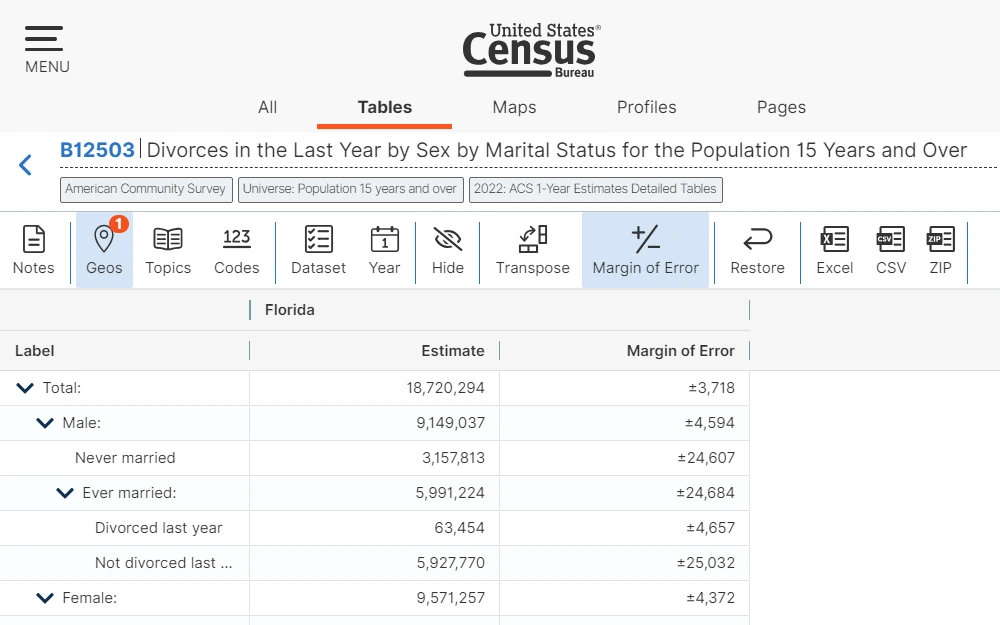
The most recent survey shows that 63,454 men and 69,400 women got divorced in Florida in 2022. While this data might not answer any questions about a specific individual’s divorce, it can deliver some helpful insight for record seekers hoping to learn more about marriage and divorce trends in Florida.
How To Search Florida Divorce Records
Florida has state-level and county-level custodians for public records, including divorce decrees. FL citizens should generally start their divorce record search with the state’s Bureau of Vital Statistics, which houses all certificates from June 6, 1927 to the present.3 Additionally, every Florida county has a Clerk of Circuit Court responsible for maintaining divorce records.
These county-level agencies forward the divorce data to the Bureau of Vital Statistics for permanent record-keeping.
Citizens can request divorce records from the Bureau of Vital Statistics in three ways: by mail, in person, and online through a third-party provider. For many record seekers, the mailed option might be easiest—unless they live near the Bureau of Vital Statistics office in Jacksonville.
To submit a mailed request, individuals should complete the Application for Florida Dissolution of Marriage Certificate. They must provide their name and contact information and as much information as they have about the divorced parties. Gather all available information, one or both parties’ full names, the date of dissolution, and the county that granted the divorce.
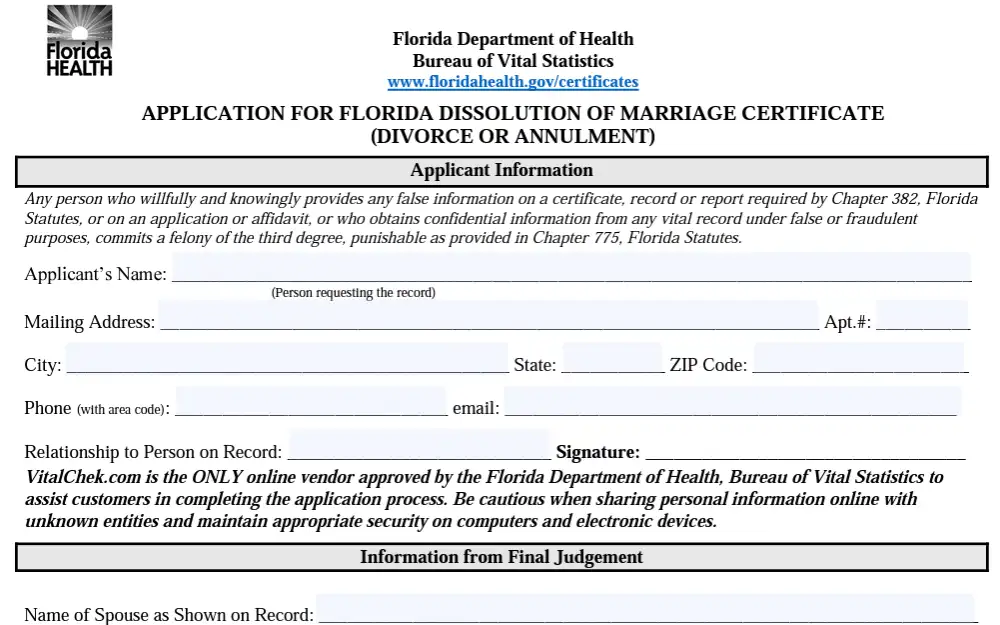
If unsure of the date of a particular divorce, the Bureau can review a date range to pull up the record. Individuals must also pay a $5 search fee and a $1 shipping fee. Other fees may apply, too.
For example, if the request requires the Bureau to search multiple years, individuals have to pay $2 per year (up to $50).
Additional certificates cost $4 each. Individuals should mail all required fees—paid via check or money order to Vital Statistics—to the following address.
Florida Department of Health
Bureau of Vital Statistics
Attn: Vital Records Section
P.O. Box 210
Jacksonville, Florida 32231-0042
Citizens local to Jacksonville—or willing to travel there—can also make their divorce records request in person. They should print and complete the form linked above to expedite the process when they arrive. The Bureau is open Monday through Friday from 8 a.m. to 4:30 p.m.
Citizens can pay their fees in person using cash, check, money order, Visa, or Mastercard.
Bureau of Vital Statistics
1217 North Pearl St.
Jacksonville, Florida 32202
Phone: 904-359-6900
Email: [email protected]
Finally, the Bureau of Vital Statistics partners with VitalChek, a government-endorsed third-party provider, to process records requests online. Visit the VitalChek divorce request page and select Florida on the map. Then, input the county, divorce date, reason for the request, their full name, and the full names of one or both divorced parties.
Like the Bureau of Vital Statistics, VitalChek can review multiple years to find the record at a cost of $2 per year. VitalChek charges $15 for the request, plus a $7 processing fee. Additional copies cost $4 each.
Parties searching for older divorce data in the state can turn to the Florida Archives, which maintains historical marriage records; this will be highlighted later in this article.
Requesting Divorce Records in FL at the County Level
The state-level search through the Bureau of Vital Statistics offers the broadest results, however, citizens can opt to start (or continue) their search for divorce records at the county level, too. Here’s when the county-level agencies can come in handy.
First, it takes about 60 days for counties to send new divorce certificates to the Bureau of Vital Statistics. So, citizens seeking information on a recent divorce might have more luck with getting efficient results at the county level.
Next, counties house the historical divorce index and can provide information on divorces that took place before June 6, 1927. Plus, if the record seeker is local to the county, it might be easier to visit the county office in person than make the trip to the Bureau of Vital Statistics in Jacksonville. For all county-level requests, individuals should contact the relevant Clerk of Court.
Miami-Dade County, the state’s largest county, provides divorce records through an online search or in-person or mailed requests. The quickest way to find out whether someone is divorced in Miami-Dade County is to use the Clerk of the Court and Comptroller public records online search.
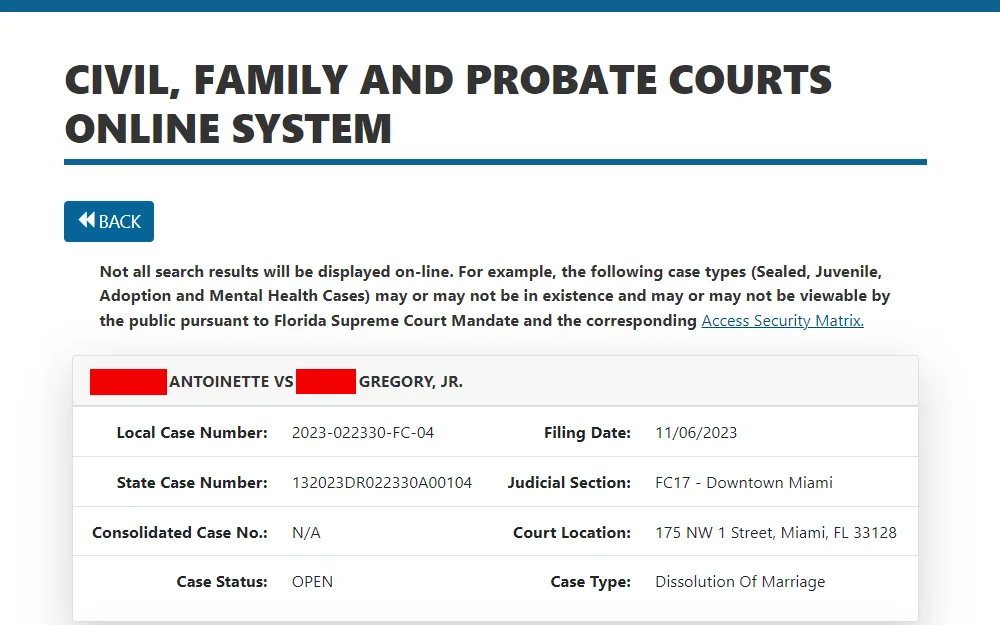
Citizens can enter the party name and select dissolution of marriage as the case type. They may also provide a date range for the divorce, though that information is not required. All divorces meeting the search criteria will be included in the results.
Click the case to learn more about the divorce, including both parties’ names, the filing date, and who was the petitioner and who was the respondent.
After viewing the divorce record, individuals can request a certified copy of it online. Individuals need to create an account to view and purchase any records.
Citizens can also request a divorce record through the Clerk of the Court & Comptroller. They can complete the Public Records Request form, providing their contact information and explaining the type of request needed. Records cost $1 per page and $2 per document, and fees are payable by cashier check or money order to the Clerk of Courts.
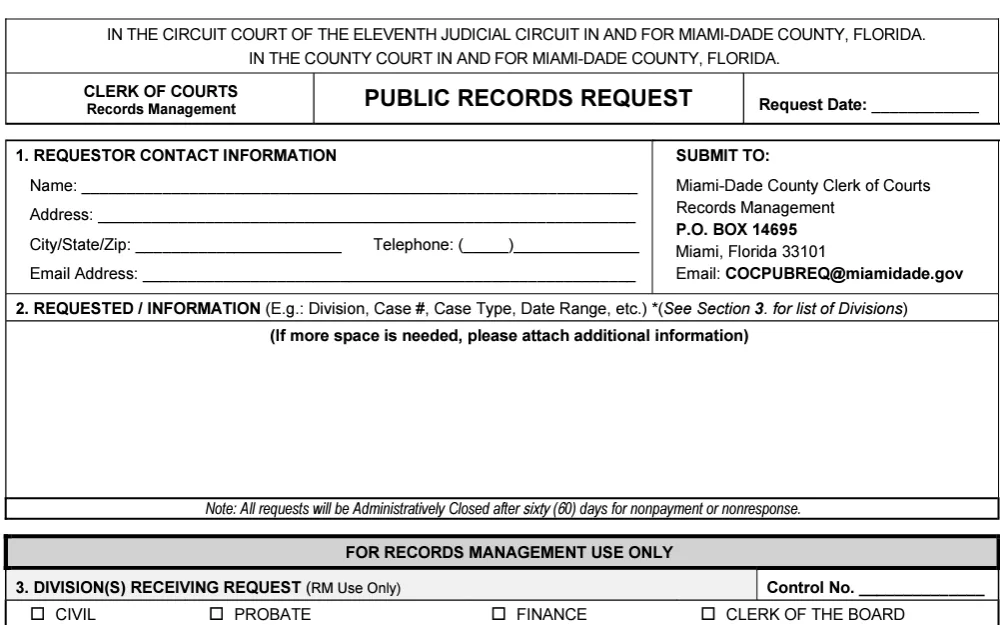
Individuals can submit their form by mail or email to the addresses below:
Miami-Dade Clerk of the Courts
Records Management
P.O. Box 14695
Miami, FL 33101
Phone: 305-275-1155
Email: [email protected]
The Clerk of Courts office accepts in-person record requests as well.7 Visit the Lawson E. Thomas Courthouse Center to make a request. They need to provide the name of the divorced parties, the date or date range of the divorce, and the case number (if available).
The Clerk of Courts will calculate all required fees ($1 per page and $2 per document), which are payable by credit card, cashier check, or money order.
Lawson E. Thomas Courthouse Center
Family Court
175 NW 1st Avenue, 14th Floor
Miami, FL 33128
Phone: 305-275-1155
Broward County offers a similar process for divorce records requests through the Clerk of the Courts. The quickest way to track down Broward County divorce records is by using the online case search. Choose Family for the court type, enter the individual’s full name, and specify a date range for the divorce.
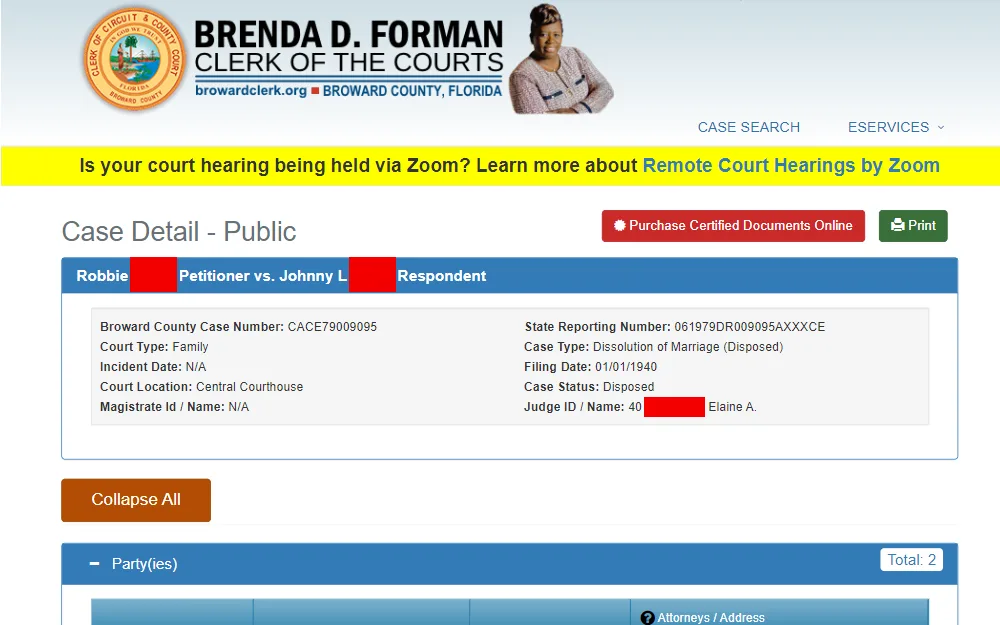
Citizens can view the case details or purchase the certified divorce record online from the case page.
Note that not all cases will have documents available for purchase, but clicking the purchase button will provide information on what’s available. Orders are processed online, and electronic certified documents cost $8 each.
The Clerk of the Courts also accepts requests via email, fax, or in person. Regardless of the method of submission, citizens need to complete the Court Records Request Form. They should provide their contact information, the divorced party’s name, and the reason for the request.
The copy fee is $1 per page, the search fee is $2 per year searched, and the certification fee is $2 per document. Individuals can visit the Archives Division at the address below during business hours (Monday to Friday, 8 a.m. to 3:30 p.m.) to submit their form.9 They may also email or fax the completed form to process their request.
Clerk of the Circuit and County Courts
Archives Division
201 Southeast 6th St.
East Wing, Rm. 03-305
Fort Lauderdale, Florida 33301
Phone: 954-831-6565
Fax: 954-831-5550
Email: [email protected]
Palm Beach County’s Clerk of the Circuit Court & Comptroller is the records custodian for divorce certificates.10 Like other Florida counties, Palm Beach also offers various ways to request divorce records. Record seekers can begin by using eCaseView, the county’s online search for cases.
Enter the individual’s name, any other available information about the divorce, and domestic relations/family as the court type. Then, citizens can peruse all available results. They have the option to purchase certified divorce certificates through E-Certify for a fee of $8 per document.
They may also view, print, or save uncertified copies of the certificate at no charge.
Yet, that’s not the only way to secure divorce records in Palm Beach County. Citizens can also submit the Records Services – Transmittal form to request divorce records. They should include a self-addressed, stamped envelope with their mailed request and payment for the record.
Divorce record fees vary and range from $1 for a certified copy to $4 for a certified copy.11 Individuals may also opt to pick up the record in person at the address below:
Palm Beach County Clerk of Circuit Court & Comptroller
205 North Dixie Highway
4th Floor, Rm. 4.2500
West Palm Beach, Florida 33402
Phone: 561-355-2932
Email: [email protected]
Mailing Address:
Palm Beach County Clerk of Circuit Court & Comptroller
P.O. Box 4526
West Palm Beach, Florida 33402-4526
In-person requests for Palm Beach County divorce records are also accepted. Visit the Records Service Center at the address listed above to make a request. Submit the Records Services – Transmittal form, linked above, along with payment using cash, check, or money order.
Both certified and non-certified copies are available for in-person requests.
In Florida, county clerk offices are the records custodians for divorces. City governments, such as those in Miami, Tampa, and Orlando, will refer record seekers to the county clerk for retrieval of divorce certificates. Explore the Florida county clerk directory to find the contact information for every county agency.12
For people conducting genealogical research, archived marriage records in Florida can provide the needed information. Learn more about how to conduct a genealogy search below.
Accessing Free Divorce Record Archives in Florida for Genealogy Purposes
Citizens on the hunt for historical divorce data are likely conducting genealogical research. The Florida Archives can be a helpful resource for this information. Start a search by using the Florida Archives online catalog, which includes divorce indexes from around the state.
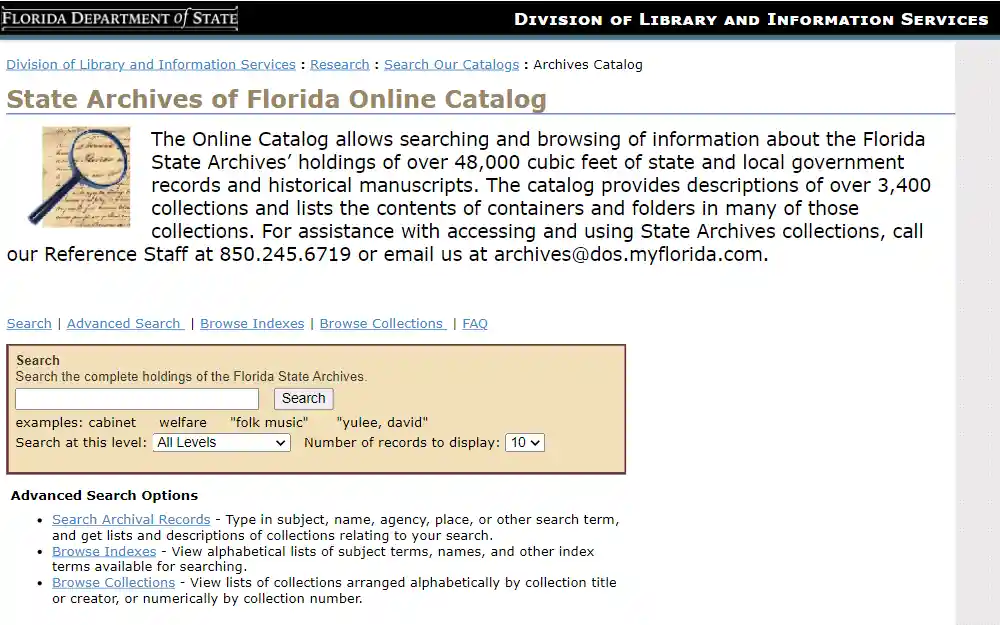
The advanced search tool can further narrow a search. The Florida Archives FAQs and Guide to Genealogical Research will help users navigate the online catalog and narrow their search for divorce records.
While the Florida Archives online catalog houses some public records data, not every record is available online. So, citizens have the opportunity to visit the Florida Archives in Tallahassee to search for records in person.
The Research Room is open at no charge during business hours, Monday through Friday, from 9 a.m. to 4:30 p.m. Citizens should check in and out with the reference staff when using the room. Record seekers can photograph any certificates or make copies at a cost of $.25 per page.
Fees are payable by cash, check, money order, or credit card.
Florida State Archives
R.A. Gray Bldg., 500 South Bronough St.
Tallahassee, Florida 32399-0250
Phone: 850-245-6719
Email: [email protected]
If record seekers can’t find the information they need at the Florida Archives or can’t make the trip to Tallahassee, there are a few other resources that may house the divorce information they need:
- Local libraries that may house archived divorce records
- Local newspapers that may have published information about divorce
- Churches or religious institutions that may have recorded such data
- Local historical and genealogy societies that can aid in research
Common Law Marriages & Divorces in Florida
Common law marriage is no longer legal in Florida. Florida Statute 741.211, established in 2016, states that no common law marriage entered into after January 1, 1968 is considered valid in the state.14 Individuals who are in a common law marriage established prior to this date can divorce in Florida and must follow the same process as married couples.
The state of Florida does not recognize other types of relationships, such as civil unions or domestic partnerships. However, some Florida cities do offer and recognize domestic partnerships, including Miami, Pembroke Pines, West Palm Beach, and Gainesville, among others.
Domestic partnerships do not require a divorce in the same sense a marriage does. Termination of a domestic partnership follows city-established guidelines. In Miami, for example, couples can submit a Declaration of Termination of Domestic Partnership Relationship to end the union.
How To Access Information About Dissolutions of Marriage & Common Law Divorces in FL
According to the Florida Statutes Chapter 61, the state courts can grant a dissolution of marriage when the union is irretrievably broken. The state does not grant such dissolutions for common law marriages unless they were entered into before 1968.
For those common law marriages that are more than a half-century old and still valid in the state, individuals must file for a dissolution of marriage like married couples. The state does not distinguish between a dissolution of marriage and common law divorce. The Bureau of Vital Statistics and county clerk offices would record all dissolution of marriages together.
Other unions, such as domestic partnerships, are terminated at the city level. Contacting the city’s records department is the most effective way to learn more information about domestic partnership terminations. As an example, the city of Orlando maintains all domestic partnership terminations, which are accessible through its online search.
How To Initiate a Divorce in Florida & Steps To Take When Served Divorce Papers
Florida couples who have lived in the state for six months or more can file for divorce, provided they have grounds for it, such as irreconcilable differences.
One or both parties may initiate the divorce proceedings. Couples with minor children must file the Petition for Dissolution of Marriage. The petitioner (the party completing the form) must sign it in front of a notary or deputy clerk.
After filing the form electronically with the Clerk of Circuit Court in the petitioner’s residing county, the spouse must be notified. A neutral third party, also known as a personal service, must notify the spouse that the petition has been filed.
The spouse (also known as the respondent) has 20 days to file an answer to the divorce petition. If those 20 days pass without an answer, the petitioner can file a Motion for Default.
At that point—once the respondent has either filed an answer, agreed with the petition, or not answered—a hearing will be scheduled. Both parties will appear in front of a judge at a hearing, where details of the divorce will be discussed. Topics may include asset division, parenting plans, and alimony.
Couples without minor children may file a Petition for Simplified Dissolution of Marriage for an uncontested divorce. They must meet other stipulations as well, including that they have worked out the division of assets, one party is not seeking alimony, and both parties waive their rights to a trial and appeal. This process typically takes less time than more complicated divorces involving children.
The Florida Statutes Chapter 61.19 states that the couple may not enter into a dissolution of marriage until at least 20 days after the petition was filed.15 However, the divorce process may take much longer depending on how quickly the parties come to an agreement, how quickly the respondent replies to the petition, and more.
Divorce fees vary from county to county, but couples can expect to pay around $400 to file for divorce through the state of Florida.
The Florida Courts publish several Petition for Dissolution of Marriage forms that can help assist an individual in filing for divorce. While some couples who remain amicable may be able to complete their divorce without legal representation, many choose to hire a divorce attorney to guide them through the process, especially if they are involved in more complicated situations, such as a mensa et thoro separation.
This resource assists citizens with finding Florida divorce records through government agencies, making publicly available data accessible.
For further public information on residents of this state, refer to either the FL marriage lookup tutorial or the overview of finding all free public records (search arrests, births, deaths, warrants, background checks, court cases, and more).
References
1The “Sunshine” Law. Texas Office of the Attorney General. (2023) Retrieved November 15, 2023, from <https://www.myfloridalegal.com/open-government/the-quotsunshinequot-law#:~:text=Florida%20began%20its%20tradition%20of,unless%20specifically%20exempted%20by%20the>
2Divorces in the Last Year by Sex by Marital Status. United States Census Bureau. (n.d.) Retrieved November 15, 2023, from <https://data.census.gov/table/ACSDT1Y2022.B12503?q=marriage+and+divorce+florida>
3Divorce. Florida Department of Health. (n.d.) Retrieved November 15, 2023, from <https://www.floridahealth.gov/certificates/certificates/divorce/index.html>
4Application For Florida Dissolution Of Marriage Certificate. Florida Department of Health. (2022) Retrieved November 15, 2023, from <https://www.floridahealth.gov/certificates/certificates/marriage/_documents/DH260-diss-marr-app-6-30-2023.pdf>
5Case Information. Miami-Dade County Clerk of the Court and Comptroller. (2023) Retrieved November 15, 2023, from <https://www2.miamidadeclerk.gov/ocs/Search.aspx?AspxAutoDetectCookieSupport=1>
6Public Records Request. Miami-Dade County Clerk of Courts. (2023) Retrieved November 15, 2023, from <https://www.miamidadeclerk.gov/library/466-Web.pdf>
7Family Cases Certified Copies. Miami-Dade County Clerk of the Court and Comptroller. (2023) Retrieved November 15, 2023, from <https://www.miamidadeclerk.gov/clerk/family-certified-copies.page>
8Case Detail – Public. Broward County Clerk of Courts. (2023) Retrieved November 15, 2023, from <https://www.browardclerk.org/Web2/CaseSearchECA/CaseDetail/?caseid=Nzk0MDY0-u%2bxwYtwelF0%3d&caseNum=CACE79009095&category=FAM&accessLevelCodeOUT=ANONYMOUS&ato=D>
9Archives. Broward County Clerk of Courts. (2023) Retrieved November 15, 2023, from <https://www.browardclerk.org/Divisions/Archives#GeneralInformation>
10Search Records. Palm Beach County Clerk of the Circuit Court and Comptroller. (n.d.) Retrieved November 15, 2023, from <https://www.mypalmbeachclerk.com/records/search-records>
11Copies & Records Research Fees. Palm Beach County Clerk of the Circuit Court and Comptroller. (n.d.) Retrieved November 15, 2023, from <https://www.mypalmbeachclerk.com/about-us/fees/public-records-fees/copies-records-research-fees>
12Find a Clerk. Florida Court Clerks & Comptrollers. (n.d.) Retrieved November 15, 2023, from <https://www.flclerks.com/page/FindaClerk>
13State Archives Of Florida Online Catalog. Florida Department of State. (n.d.) Retrieved November 15, 2023, from <http://archivescatalog.info.florida.gov/>
14741.211. The Florida Senate. (2023) Retrieved November 15, 2023, from <https://www.flsenate.gov/Laws/Statutes/2016/0741.211>
15Chapter 61. The Florida Legislature. (2023) Retrieved November 15, 2023, from <http://www.leg.state.fl.us/STATUTES/index.cfm?App_mode=Display_Statute&URL=0000-0099/0061/Sections/0061.19.html>
